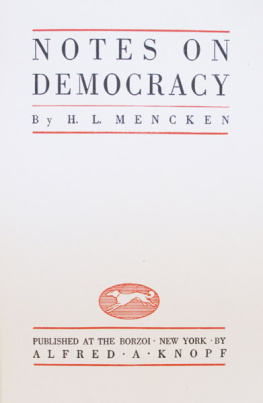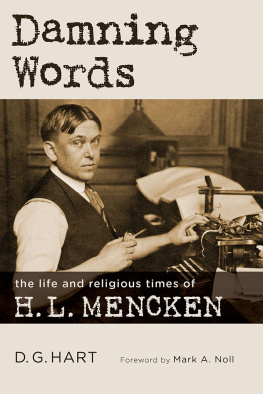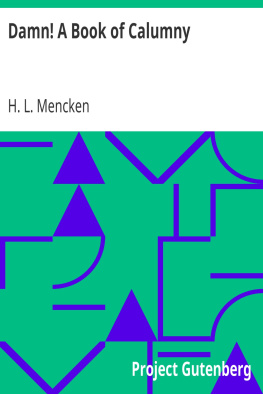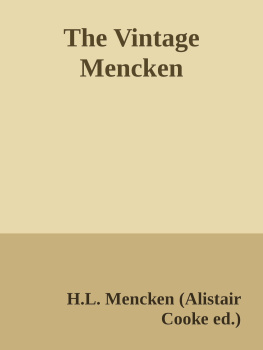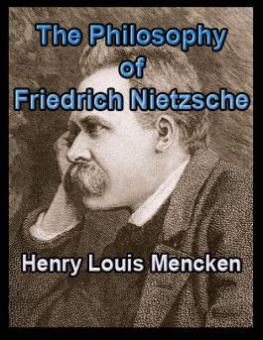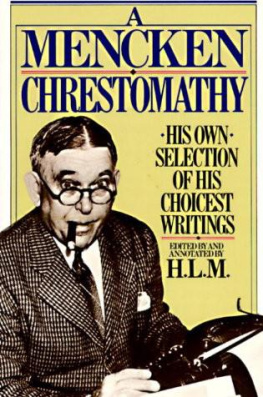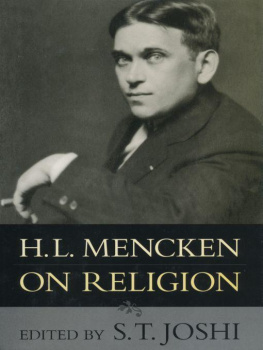H. L Mencken - Notes on Democracy
Here you can read online H. L Mencken - Notes on Democracy full text of the book (entire story) in english for free. Download pdf and epub, get meaning, cover and reviews about this ebook. year: 1926, publisher: Knopf, genre: Detective and thriller. Description of the work, (preface) as well as reviews are available. Best literature library LitArk.com created for fans of good reading and offers a wide selection of genres:
Romance novel
Science fiction
Adventure
Detective
Science
History
Home and family
Prose
Art
Politics
Computer
Non-fiction
Religion
Business
Children
Humor
Choose a favorite category and find really read worthwhile books. Enjoy immersion in the world of imagination, feel the emotions of the characters or learn something new for yourself, make an fascinating discovery.
- Book:Notes on Democracy
- Author:
- Publisher:Knopf
- Genre:
- Year:1926
- Rating:4 / 5
- Favourites:Add to favourites
- Your mark:
- 80
- 1
- 2
- 3
- 4
- 5
Notes on Democracy: summary, description and annotation
We offer to read an annotation, description, summary or preface (depends on what the author of the book "Notes on Democracy" wrote himself). If you haven't found the necessary information about the book — write in the comments, we will try to find it.
Notes on Democracy — read online for free the complete book (whole text) full work
Below is the text of the book, divided by pages. System saving the place of the last page read, allows you to conveniently read the book "Notes on Democracy" online for free, without having to search again every time where you left off. Put a bookmark, and you can go to the page where you finished reading at any time.
Font size:
Interval:
Bookmark:
DEMOCRACY
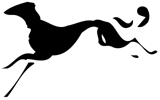
WHICH THIS BOOK IS SET
This book is composed on the Linotype in Bodoni, so-calledafter its designer, Giambattista Bodoni (1740-1813)a celebrated Italian scholar and printer. Bodoniplanned his type especially for use on the moresmoothly finished papers that came into vogue late inthe eighteenth century and drew his letters with amechanical regularity that is readily apparent oncomparison with the less formal old style. Othercharacteristics that will be noted are the square serifswithout fillet and the marked contrast between thelight and heavy strokes.

SET UP AND ELECTROTYPED BY THE
VAIL-BALLOU PRESS, INC., BING
HAMTON, N.Y. ESPARTO PAPER
MANUFACTURED IN SCOTLAND
AND FURNISHED BY W. F.
ETHERINGTON&CO., NEW
YORK PRINTED AND
BOUND BY THE PLIMP
TON PRESS, NOR
WOOD, MASS.
I
Democracy came into the Western World tothe tune of sweet, soft music. There was, at thestart, no harsh bawling from below; there wasonly a dulcet twittering from above. Democraticman thus began as an ideal being, full ofineffable virtues and romantic wrongsin brief,as Rousseau's noble savage in smock and jerkin,brought out of the tropical wilds to shame thelords and masters of the civilized lands. Thefact continues to have important consequencesto this day. It remains impossible, as it was inthe Eighteenth Century, to separate the democraticidea from the theory that there is a mysticalmerit, an esoteric and ineradicablerectitude, in the man at the bottom of the scalethatinferiority, by some strange magic, becomesa sort of superioritynay, the superiorityof superiorities. Everywhere on earth, savewhere the enlightenment of the modern age is confessedlyin transient eclipse, the movement istoward the completer and more enamoured enfranchisementof the lower orders. Down there,one hears, lies a deep, illimitable reservoir ofrighteousness and wisdom, unpolluted by thecorruption of privilege. What baffles statesmenis to be solved by the people, instantly and by asort of seraphic intuition. Their yearnings arepure; they alone are capable of a perfect patriotism;in them is the only hope of peace andhappiness on this lugubrious ball. The cure forthe evils of democracy is more democracy!
This notion, as I hint, originated in the poeticfancy of gentlemen on the upper levelssentimentalistswho, observing to their distress thatthe ass was over-laden, proposed to reform transportby putting him into the cart. A staleChristian bilge ran through their veins, thoughmany of them, as it happened, toyed with whatis now called Modernism. They were the directancestors of the more saccharine Liberalsof to-day, who yet mouth their tattered phrasesand dream their preposterous dreams. I canfind no record that these phrases, in the beginning,made much impression upon the actualobjects of their rhetoric. Early democratic manseems to have given little thought to the democraticideal, and less veneration. What hewanted was something concrete and highly materialisticmoreto eat, less work, higher wages,lower taxes. He had no apparent belief in theacroamatic virtue of his own class, and certainlynone in its capacity to rule. His aim was notto exterminate the baron, but simply to bringthe baron back to a proper discharge of baronialbusiness. When, by the wild shooting thatnaturally accompanies all mob movements, theformer end was accidentally accomplished, andmen out of the mob began to take on baronialairs, the mob itself quickly showed its opinionof them by butchering them deliberately and inearnest. Once the pikes were out, indeed, it wasa great deal more dangerous to be a tribune ofthe people than to be an ornament of the old order.The more copiously the blood gushed, thenearer that old order came to resurrection. TheParis proletariat, having been misled into killingits King in 1793, devoted the next two years tokilling those who had misled it, and by the middleof 1796 it had another King in fact, and inthree years more he was King de jure, with anattendant herd of barons, counts, marquises anddukes, some of them new but most of them old,to guard, symbolize and execute his sovereignty.And he and they were immensely popularsopopular that half France leaped to suicide thattheir glory might blind the world.
Meanwhile, of course, there had been a certainseeping down of democratic theory fromthe metaphysicians to the mobobscured by theuproar, but still going on. Rhetoric, like astealthy plague, was doing its immemorial work.Where men were confronted by the harsh, exigentrealities of battle and pillage, as they wereeverywhere on the Continent, it got into theirveins only slowly, but where they had time tolisten to oratory, as in England and, above all, inAmerica, it fetched them more quickly. Eventually,as the world grew exhausted and thewars passed, it began to make its effects felteverywhere. Democratic man, contemplatinghimself, was suddenly warmed by the spectacle.His condition had plainly improved. Once aslave, he was now only a serf. Once condemnedto silence, he was now free to criticize his masters,and even to flout them, and the ordinances ofGod with them. As he gained skill and fluencyat that sombre and fascinating art, he began toheave in wonder at his own merit. He was notonly, it appeared, free to praise and damn, challengeand remonstrate; he was also gifted with apeculiar rectitude of thought and will, and ahigh talent for ideas, particularly on the politicalplane. So his wishes, in his mind, began totake on the dignity of legal rights, and after awhile, of intrinsic and natural rights, and by thesame token the wishes of his masters sank to thelevel of mere ignominious lusts. By 1828 inAmerica and by 1848 in Europe the doctrine hadarisen that all moral excellence, and with it allpure and unfettered sagacity, resided in the inferiorfour-fifths of mankind. In 1867 a philosopherout of the gutter pushed that doctrine toits logical conclusion. He taught that the superiorminority had no virtues at all, and henceno rights at allthat the world belonged exclusivelyand absolutely to those who hewed itswood and drew its water. In less than half acentury he had more followers in the world, openand covert, than any other sophist since the ageof the Apostles.
Since then, to be sure, there has been a considerablerecession from that extreme position.The dictatorship of the proletariat, tried hereand there, has turned out to beif I may venturea prejudiced judgmentsomewhat impracticable.Even the most advanced Liberals, observingthe thing in being, have been moved to coughsadly behind their hands. But it would certainlybe going beyond the facts to say that theunderlying democratic dogma has been abandoned,or even appreciably overhauled. To thecontrary, it is now more prosperous than everbefore. The late war was fought in its name,and it was embraced with loud hosannas by allthe defeated nations. Everywhere in Christendomit is now official, save in a few benightedlands where God is temporarily asleep. Everywhereits fundamental axioms are accepted: (a)that the great masses of men have an inalienableright, born of the very nature of things, to governthemselves, and (b) that they are competentto do it. Are they occasionally detected in grossand lamentable imbecilities? Then it is onlybecause they are misinformed by those whowould exploit them: the remedy is more education.Are they, at times, seen to be a triflenaughty, even swinish? Then it is only a naturalreaction against the oppressions they suffer:the remedy is to deliver them. The central aimof all the Christian governments of to-day, intheory if not in fact, is to further their liberation,to augment their power, to drive ever largerand larger pipes into the great reservoir of theirnatural wisdom. That government is calledgood which responds most quickly and accuratelyto their desires and ideas. That is calledbad which conditions their omnipotence and putsa question mark after their omniscience.
Next pageFont size:
Interval:
Bookmark:
Similar books «Notes on Democracy»
Look at similar books to Notes on Democracy. We have selected literature similar in name and meaning in the hope of providing readers with more options to find new, interesting, not yet read works.
Discussion, reviews of the book Notes on Democracy and just readers' own opinions. Leave your comments, write what you think about the work, its meaning or the main characters. Specify what exactly you liked and what you didn't like, and why you think so.

